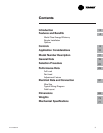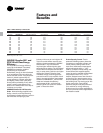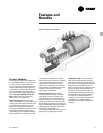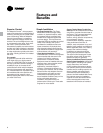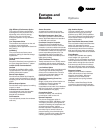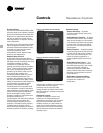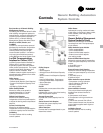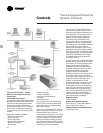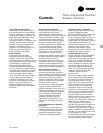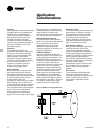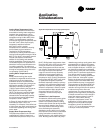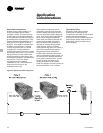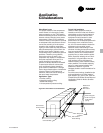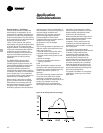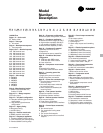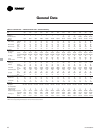
11RLC-PRC006-EN
Controls
Trane Chiller Plant Automation
Trane’s depth of experience in chillers
and controls makes us a well-qualified
choice for automation of chiller plants
using air-cooled Series R
®
chillers
®
. The
chiller plant control capabilities of the
Trane Tracer Summit
®
building
automation system are unequaled in the
industry. Our chiller plant automation
software is fully pre-engineered and
tested. It is a standard software
application, not custom programming
which can prove to be difficult to
support, maintain, and modify.
Energy Efficiency
Trane chiller plant automation
intelligently sequences starting of
chillers to optimize the overall chiller
plant energy efficiency. Individual chillers
are designated to operate as base, peak,
or swing based on capacity and
efficiency. Sophisticated software
automatically determines which chiller
to run in response to current conditions.
The software also automatically rotates
individual chiller operation to equalize
runtime and wear between chillers.
Trane chiller plant automation enables
unique energy-saving strategies. An
example is controlling pumps, and
chillers from the perspective of overall
system energy consumption. The
software intelligently evaluates and
selects the lowest energy consumption
alternative.
Trane Integrated Comfort
System Controls
Keeping Operators Informed
A crucial part of efficiently running a
chiller plant is assuring that the
operations staff is instantly aware of
what is happening in the plant. Graphics
showing schematics of chillers, piping,
pumps, and towers clearly depict the
chiller plant system, enabling building
operators to easily monitor overall
conditions. Status screens display both
current conditions and upcoming
automated control actions to add or
subtract chiller capacity. Series R and
other chillers can be monitored and
controlled from a remote location.
Tracer Summit features standard report
templates listing key operating data for
troubleshooting and verifying
performance. Reports for each type of
Trane chiller and three and six-chiller
systems are also standard. Detailed
reports showing chiller runtimes aid in
planning for preventative maintenance.
Swift Emergency Response
We understand the importance of
maintaining chilled water production
while protecting your chillers from costly
damage. If no water flow is detected to a
chiller’s piping, the start sequence is
aborted to protect the chiller. The next
chiller in the sequence is immediately
started to maintain cooling.
In the event of a problem, the operator
receives an alarm notification and
diagnostic message to aid in quick and
accurate troubleshooting. A snapshot
report showing system status just prior
to an emergency shutdown helps
operators determine the cause. If
emergency conditions justify an
immediate manual shutdown, the
operator can override the automatic
control.
Easy Documentation for Regulatory
Compliance
Comprehensive documentation of
refrigerant management practices is
now a fact of life. Trane chiller plant
automation generates the reports
mandated in ASHRAE Guideline 3.
Integrated Comfort
™
Capabilities
When integrated with a Tracer Summit
building management system
performing building control, Trane chiller
plant automation coordinates with
Tracer Summit applications to optimize
the total building operation. With this
system option, the full breadth of Trane’s
HVAC and controls experience are
applied to offer solutions to many facility
issues. If your project calls for an
interface to other systems, Tracer
Summit can share data via BACnet
™
, the
ASHRAE open systems protocol.
Ice Making Systems Controls
Simple and smart control strategies are
another advantage the Model RTAC
chiller offers for ice storage applications.
Trane Tracer
™
building management
systems can actually anticipate how
much ice needs to be made at night and
operate the system accordingly. The
controls are integrated right into the
chiller. Two wires and preprogrammed
software dramatically reduce field
installation cost and complex
programming.
When the ice making option is ordered,
the air-cooled Series R chiller will have
two operating modes, ice making and
normal daytime cooling. In the ice
making mode, the air-cooled Series R
chiller will operate at full compressor
capacity until the return chilled fluid
temperature entering the evaporator
meets the ice making setpoint. This ice
making setpoint is manually adjusted on
the unit’s microcomputer. Two input
signals are required to the air-cooled
Series R chiller for the ice making option.
The first is an auto/stop signal for
scheduling and the second is required to
switch the unit in between the ice
making mode and normal daytime
operation. The signals are provided by a
remote job site building automation
device such as a time clock or a manual
switch. In addition, the signals may be
provided over the twisted wire pair from
a Tracer system or LonTalk
Communication Interface but will require
the communication boards provided
with the Ice Making Control Option.



